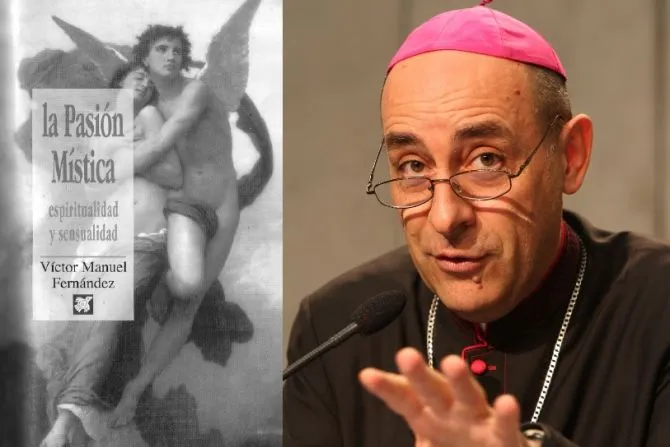Fernández’s description of “an experience of love, a passionate encounter with Jesus, that a sixteen-year-old-teenager [girl] told me about,” comes in the book’s sixth chapter, “My Beautiful, Come.”
The passage speaks of encountering Christ at the Sea of Galilee as he bathes and lies in the sand, and includes a lengthy description of kissing and caressing his body from head to toe.
Throughout the passage, the Blessed Mother is depicted as standing by and approvingly allowing the encounter to take place.
The book’s final section focuses on the human orgasm and its connection to divine intimacy, often utilizing graphic, provocative descriptions.
For instance, in a chapter titled “Male and Female Orgasm,” Fernández provides an extensive, detailed description of sexual intercourse, offering his assessment of differences in male and female preferences and experiences of orgasm.
(Story continues below)
However, Fernández goes on to conclude that “in the mystical experience God touches the most intimate center of love and pleasure, a center where it does not matter much whether we are male or female.”
In the chapter “The Road to Orgasm,” Fernandez seems to suggest that the saints experienced sexual pleasure in their mystical unions with God.
“Some saints began to have inebriating experiences of God shortly after their conversion, or at the same conversion; others, like Saint Teresa of Ávila, achieved these experiences after many years of spiritual dryness. Saint Therese of Lisieux, although she felt tenderly loved by God, never had very ‘sensual’ experiences of his love, and it seems that she only achieved an overflowing and passionate joy at the moment of her death, when her face was transfigured and she said her last words: ‘I love you, oh my God, I love you!’”
The cardinal also seems to address sexual relations between people of the same sex.
After writing that an experience of divine love will not necessarily “mean, for example, that a homosexual will necessarily stop being homosexual,” Fernández notes “that God’s grace can coexist with weaknesses and even with sins, when there is a very strong conditioning. In those cases, the person can do things that are objectively sinful, without being guilty, and without losing the grace of God or the experience of his love.”
After reflecting on how persons can reach “a kind of fulfilling orgasm in our relationship with God,” the cardinal writes in the chapter “God in the couple’s orgasm” that God can be present “when two human beings love each other and reach orgasm; and that orgasm, experienced in the presence of God, can also be a sublime act of worship of God.”
While Fernández speaks of “couples” in his description of sexual relations, he rarely explicitly mentions sacramental marriage, which the Church teaches is the only context in which sexual relations are licit.
In another passage, the now-DDF head condemns masturbation as selfish but describes authentic sexual relations as only vaguely “open to others,” with no mention of openness to generating new life.
The Catechism of the Catholic Church teaches that sexual relations in marriage “remain ordered per se to the procreation of human life” and describes both the unitive and procreative significance as “both inherent to the marriage act.”
In one particularly graphic passage, Fernández cites the 15th-century Muslim theologian Al Sounouti, who offered praise to God for making men’s reproductive organs “as hard and straight as spears” so that they can “wage war” on the corresponding body parts of women.
Discussion of Fernández’s 1998 book comes at a time when the Argentinian prelate’s leadership of the DDF has come under significant scrutiny following the Dec. 18 publication of guidance on the possibility of blessing same-sex couples. The Vatican document, Fiducia Supplicans, has widely been criticized for ambiguity and for failing to engage in wider consultation with the world’s bishops before publication.
On Jan. 4, Fernández issued an unprecedented 2,000-word press release clarification of Fiducia Supplicans. The clarification came after worldwide pushback, with entire episcopal conferences in Africa and Eastern Europe and individual bishops in Latin America, Europe, and the United States stating that they would not allow the described blessings in their jurisdictions.
A longtime theological adviser to Pope Francis, Fernández was made a cardinal by the pope on Sept. 30, 2023, shortly after he began his duties at the DDF. In his letter announcing the appointment, Pope Francis wrote that he expected Fernández to promote “theological knowledge” rather than focus on disciplining “doctrinal errors.”








